
Ernst Enno
Ernst Enno (8. VI / 27. V 1875 – 7. III 1934) was a poet who also wrote short prose. He was one of the first writers in Estonia to be influenced by symbolism. He is considered to be the founder of the mystical poetic tradition.
Enno was born in Rannu Parish in Tartu County and eventually moved with his family to Rõngu Parish. After studying at Tartu Hugo Treffner Gymnasium and at the Tartu School of Science, he continued his studies at Riga Polytechnical Institute in the Trade Department from 1896–1904. Enno worked as a journalist in Tartu, as an official in Pärnu, and as a secretary and teacher in Valga. From 1919 until his death he was a school counselor in Lääne County and lived in Haapsalu. In 1922–1927, he was also the editor of the children’s journal Laste Rõõm.
Enno’s first poems were published in 1896. He began writing literary texts more consistently at the start of the new century after being influenced by the work of Maurice Maeterlinck and Rainer Maria Rilke. In addition to fiction, philosophical and religious literature became increasingly important to him. He became interested in theosophy and Buddhism and translated, for example, the Taoist reflections by Laozi.
Enno published four poetry collections: Uued luuletused (‘New Poems’, 1908), Hallid laulud (‘Gray Songs’, 1910), Valge öö (‘White Night’, 1920), Kadunud kodu (‘Lost Home’, 1920). His later works were mostly handwritten manuscripts and were only published after his death. The most extensive and multi-faceted edition of Enno’s poems were compiled by Urmas Tõnisson in Rändaja õhtulaul (‘The Wanderer’s Evening Song’, 1998). This book marked a new rise of reception and a reinterpretation of Enno’s work at the end of the twentieth century and beginning of the twenty-first century.
Several texts from the first two poetry collections have remained among Enno’s most well-known. The poem Rändaja õhtulaul is among these, which was the title for the later collection. It poeticizes “gray and endless roads,” which has become one of the most famous lines in Estonian poetry. The paths in this poem are “the wanderer’s households,” while simultaneously acting as expressions of concrete and figurative landscapes.
Despite its reputation, the reception of Enno’s published work was controversial, partly because Friedebert Tuglas and Gustav Suits, leading figures of the most important literary group Noor-Eesti (‘Young Estonia’), were critical towards it. There is reason to discuss the rise of neo-romantic literature in the case of both Enno and Noor-Eesti, but Enno is distinguished from other authors. Playing with philosophical backgrounds, he also had a pantheistic sense of nature and conducted mythical searches connected with personal experience, leading him to seek out the more obscure meanings behind his words and to pay less attention to refined external form. Enno’s verse is often based on enchanting repetitions: instead of intellectual clarity, it foregrounds the melodic sound of language with a notion that some things can’t be put into words.
Enno was also one of the most outstanding writers of children’s poetry in Estonia; his work as editor of Laste Rõõm especially favored this. Ellen Niit later compiled the best of his work for children in the book Üks rohutirts läks kõndima (‘A Grasshopper Went Walking’). Enno’s children’s poetry does not generally have noticeable philosophical sub-texts; nonetheless, texts with different recipients are connected through games using the sound of language and reflections of nature.
Enno’s career as a prose writer was pretty much non-existent, but his autobiographical collection of short stories, Minu sõbrad (‘My Friends’ (1910)) still received attention. Madis Kõiv based his play Las olla pääle (‘Let It Be’, directed with the title Ennola in 2003) on this book. In twentieth-century literature, Minu sõbrad is, among other things, one of the most influential examples of how the South Estonian dialect (specifically the Tartu dialect) can be used in prose dialogue for something other than comical purposes.
M. V. (Translated by M. M.)
Books in Estonian
Poems
Uued luuletused. Tartu: Noor-Eesti, 1909, 62 lk.
Hallid laulud. Tartu, 1910, 56 lk.
Valge öö: uus kogu luuletusi 1916/1918. Tallinn: Varrak, 1920, 70 lk.
Kadunud kodu: uus kogu luuletusi 1916/1918. Tallinn: Varrak, 1920, 74 lk.
Valitud värsid. Koostanud Bernard Kangro. Tartu: Eesti Kirjanduse Selts, 1937, 270 lk.
Kadunud kodu: luulevalimik. Koostanud Bernard Kangro. Göteborg: Orto, 1950, 80 lk.
Ernst Enno. Koostanud August Sang. Tallinn: Eesti Riiklik Kirjastus, 1964. [Sari ‘Väike luuleraamat’.]
Rändaja õhtulaul. Koostanud Urmas Tõnisson. Tartu: Ilmamaa, 1998, 328 lk. [2. trükk: 2008.]
Igatsuse laulud: 1896–1934. Koostanud Karl Muru. Tallinn: Tänapäev, 2007, 96 lk.
Imelikku rada pikka. Koostanud ja järelsõna: Lauri Sommer. Tallinn: Tänapäev, 2020, 271 lk. [Valikkogu.]
Short stories
Minu sõbrad. Tartu, 1910, 112 lk. [2. trükk: 1973.]
Children’s literature
Heinaaeg on ikka nii. Tartu: Loodus, 1937, 7 lk. [Luuletus. 2. trükk: 1937.]
Tibuke. Tartu: Loodus, 1937, 11 lk. [Jutt.]
Väike peremees. Tartu: Loodus, 1937, 11 lk. [Luuletus. Järgnevad trükid: 1943, 1991.]
Loomad. Tartu: Loodus, 1938, 15 lk. [Luule. Järgnevad trükid: 1938, 1943, 1992, 2012]
Üks rohutirts läks kõndima: luuletusi lastele. Koostanud Ellen Niit. Tallinn: Eesti Riiklik Kirjastus, 1957, 104 lk. [Järgnevad trükid: 1971, 1972, 2001, 2003.]
Üks rohutirts läks kõndima. Tallinn: Eesti Raamat, 1983, 9 lk. [Luule. Järgnevad trükid: 1984, 1993.]
Juss oli väike peremees. Tallinn: Tänapäev, 2001, 61 lk. [Luuletused. Sari „Minu esimene raamat“.]
Tibukese unenägu. Tallinn: Piip ja Prillid, 2011, 14 lk. [Luule.]
Pimesikk. Koostanud Olivia Saar. Tallinn: TEA Kirjastus, 2013, 48 lk. [Luule.]
About Ernst Enno
Elin Toona, Rõõm teeb taeva taga tuld. Ernst Enno. Tartu: Ilmamaa, 2000, 326 lk.



